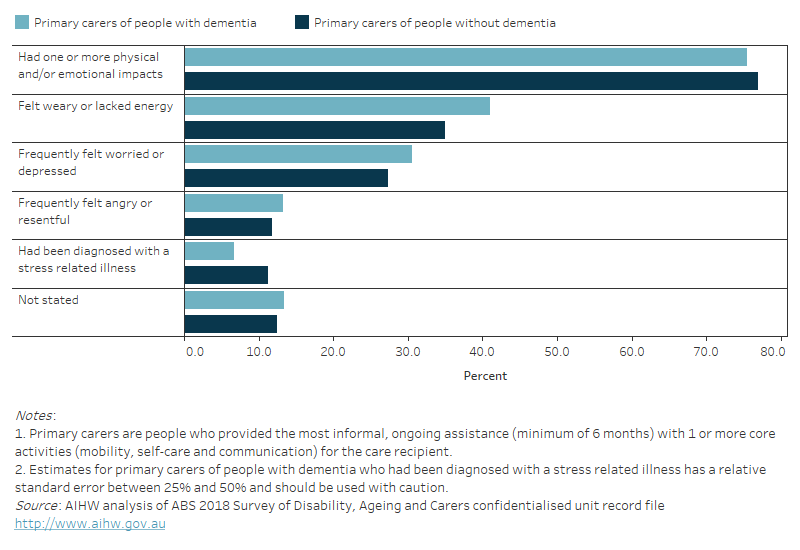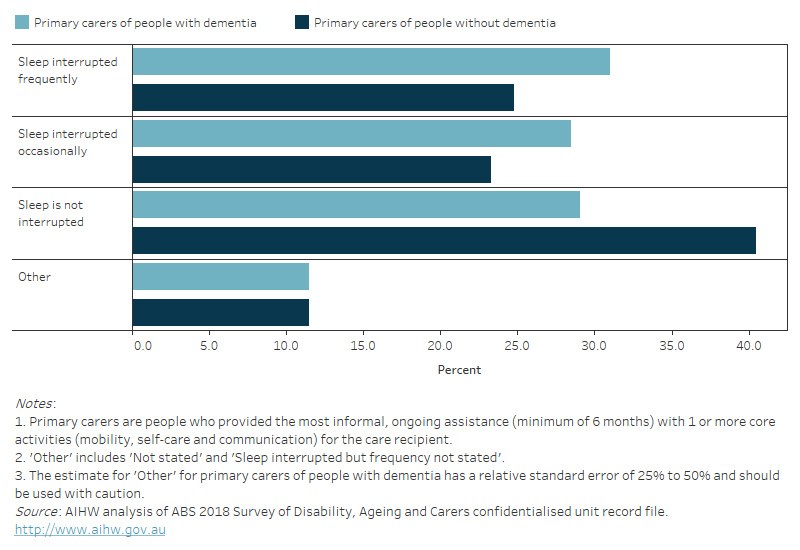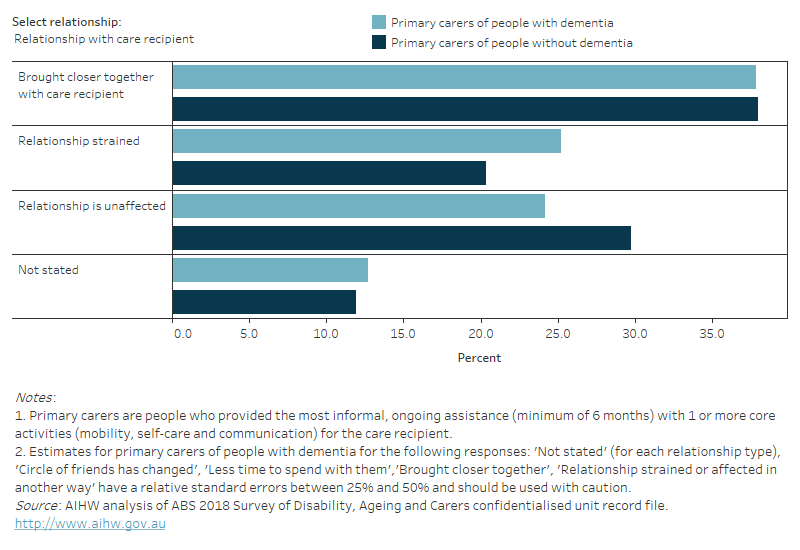Impact of the caring role on carers
Caring for a person with any type of disability or chronic condition can be physically, mentally, emotionally and economically demanding, and the burden of caregiving is particularly high for those caring for a person with dementia. Factors influencing the level of caregiving burden include the personal characteristics of carers and care recipients, living arrangements, employment and financial situation, and support systems available from formal services and other family and friends.
This page presents information from the Australian Bureau of Statistics Survey of Disability, Ageing and Carers (SDAC) on the impact of caring for a person with dementia on the primary carer’s physical and emotional wellbeing, relationships, employment and financial situation in 2018.
Impacts on carers’ physical and emotional health and wellbeing
Around 3 in 4 primary carers of people with dementia (75%), as well as primary carers of people without dementia (77%) reported they had 1 or more physical or emotional effects due to the caring role (Figure 6.5).
The most commonly reported impact was that the carer felt weary or lacked energy, reported by 41% of primary carers of people with dementia and 35% of primary carers of people without dementia. Another commonly reported effect was frequently feeling worried or depressed, reported by 31% of primary carers of people with dementia and 27% of primary carers of people without dementia.
The proportion of primary carers who frequently felt angry or resentful and who had been diagnosed with a stress related illness was similar among primary carers of people with dementia (13% and 6.7%, respectively) and primary carers of people without dementia (12% and 11%, respectively).
Figure 6.5: Primary carers of people with dementia and people without dementia in 2018: percentage by physical and emotional impacts of the caring role
Figure 6.5 is a bar graph showing the percentage of primary carers of people with dementia and primary carers of people without dementia in 2018 by the physical and emotional impacts experienced since taking on the caring role. Around three-quarters of primary carers of people with dementia as well as primary carers of people without dementia reported they had 1 or more physical or emotional impacts due to the caring role. The most commonly reported impact by primary carers of people with dementia was feeling weary or lacking energy. In addition, just under one-third of primary carers of people with dementia reported frequently feeling worried or depressed.

Sleep is essential to improving and maintaining a person’s health and wellbeing. However, caring responsibilities can directly impact the length and quality of a carer’s sleep.
Among primary carers of people with dementia, 31% reported their sleep was interrupted frequently and 29% reported their sleep was interrupted occasionally due to the caring role. By comparison, 25% of primary carers of people without dementia reported their sleep was interrupted frequently and 23% reported their sleep was interrupted occasionally. There was also no statistical difference in the percentages between primary carers of people with dementia and primary carers of people without dementia (Figure 6.6).
Figure 6.6: Primary carers of people with dementia and people without dementia in 2018: percentage by sleep disturbances due to the caring role
Figure 6.6 is a bar graph showing the percentage of primary carers of people with dementia and primary carers of people without dementia in 2018 by whether they experienced sleep disturbances since taking on the caring role. Almost one-third of primary carers of people with dementia reported their sleep was interrupted frequently and almost one-third reported their sleep was interrupted occasionally due to the caring role. Primary carers of people without dementia were less likely to report their sleep was interrupted frequently or occasionally.

Impact of the caring role on carers’ relationship with the care recipient, family and friends
The caring role can have both positive and negative impacts on the relationship between the carer and the recipient of care, as well as on the carer’s relationship to others.
Primary carers of people with dementia most commonly reported that the caring role:
- brought them closer to the care recipient (38% of primary carers of people with dementia). This was reported similarly by primary carers of people without dementia (38%)
- resulted in them spending less time with other family members who live in the same house (14%). This was reported similarly by primary carers of people without dementia (15%)
- resulted in them losing touch with friends (34%). This was reported less by primary carers of people without dementia (24%) (Figure 6.7).
Figure 6.7: Primary carers of people with dementia and people without dementia in 2018: percentage by impact of the caring role on others
Figure 6.7 is a bar graph showing the percentage of primary carers of people with dementia and primary carers of people without dementia in 2018 by the impact of the caring role on the carer’s relationship with the care recipient, family and friends. Primary carers of people with dementia and people without dementia most frequently reported that the caring role brought them closer to the care recipient but that it resulted in them spending less time with other family members who live in the same house. Compared to primary carers of people without dementia, primary carers of people with dementia more frequently reported that taking on the caring role had resulted in them losing touch with their friends.



